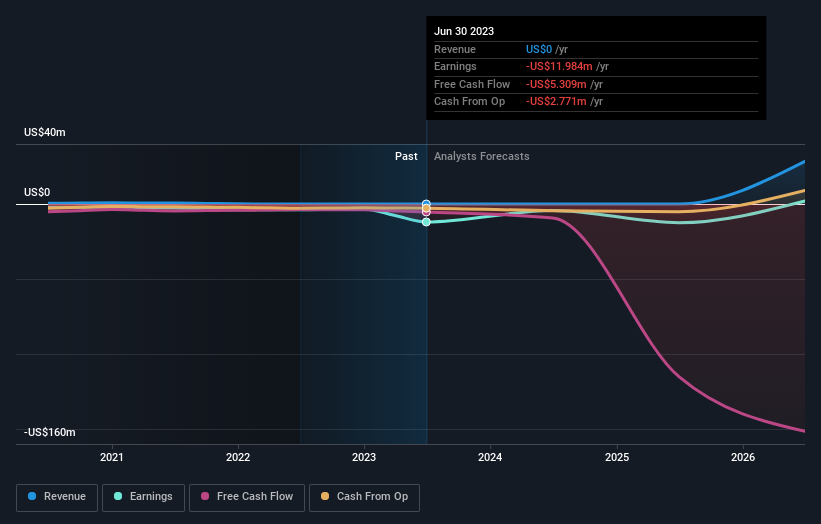Rainbow Rare Earths Limited (LON:RBW) most popular amongst retail investors who own 55%, insiders hold 27%
Key Insights
Significant control over Rainbow Rare Earths by retail investors implies that the general public has more power to influence management and governance-related decisions
45% of the business is held by the top 13 shareholders
Insider ownership in Rainbow Rare Earths is 27%
If you want to know who really controls Rainbow Rare Earths Limited (LON:RBW), then you'll have to look at the makeup of its share registry. The group holding the most number of shares in the company, around 55% to be precise, is retail investors. In other words, the group stands to gain the most (or lose the most) from their investment into the company.
Individual insiders, on the other hand, account for 27% of the company's stockholders. Insiders often own a large chunk of younger, smaller, companies while huge companies tend to have institutions as shareholders.
Let's take a closer look to see what the different types of shareholders can tell us about Rainbow Rare Earths.
See our latest analysis for Rainbow Rare Earths

What Does The Institutional Ownership Tell Us About Rainbow Rare Earths?
Institutional investors commonly compare their own returns to the returns of a commonly followed index. So they generally do consider buying larger companies that are included in the relevant benchmark index.
Since institutions own only a small portion of Rainbow Rare Earths, many may not have spent much time considering the stock. But it's clear that some have; and they liked it enough to buy in. If the company is growing earnings, that may indicate that it is just beginning to catch the attention of these deep-pocketed investors. When multiple institutional investors want to buy shares, we often see a rising share price. The past revenue trajectory (shown below) can be an indication of future growth, but there are no guarantees.

We note that hedge funds don't have a meaningful investment in Rainbow Rare Earths. Our data shows that Adonis Pouroulis is the largest shareholder with 13% of shares outstanding. In comparison, the second and third largest shareholders hold about 11% and 5.8% of the stock. George Sidney Bennett, who is the third-largest shareholder, also happens to hold the title of Member of the Board of Directors.
A deeper look at our ownership data shows that the top 13 shareholders collectively hold less than half of the register, suggesting a large group of small holders where no single shareholder has a majority.
Researching institutional ownership is a good way to gauge and filter a stock's expected performance. The same can be achieved by studying analyst sentiments. Quite a few analysts cover the stock, so you could look into forecast growth quite easily.
Insider Ownership Of Rainbow Rare Earths
The definition of an insider can differ slightly between different countries, but members of the board of directors always count. Management ultimately answers to the board. However, it is not uncommon for managers to be executive board members, especially if they are a founder or the CEO.
Most consider insider ownership a positive because it can indicate the board is well aligned with other shareholders. However, on some occasions too much power is concentrated within this group.
Our most recent data indicates that insiders own a reasonable proportion of Rainbow Rare Earths Limited. Insiders own UK£24m worth of shares in the UK£90m company. This may suggest that the founders still own a lot of shares. You can click here to see if they have been buying or selling.
General Public Ownership
The general public, mostly comprising of individual investors, collectively holds 55% of Rainbow Rare Earths shares. With this amount of ownership, retail investors can collectively play a role in decisions that affect shareholder returns, such as dividend policies and the appointment of directors. They can also exercise the power to vote on acquisitions or mergers that may not improve profitability.
Private Company Ownership
We can see that Private Companies own 16%, of the shares on issue. It might be worth looking deeper into this. If related parties, such as insiders, have an interest in one of these private companies, that should be disclosed in the annual report. Private companies may also have a strategic interest in the company.
Next Steps:
I find it very interesting to look at who exactly owns a company. But to truly gain insight, we need to consider other information, too. Be aware that Rainbow Rare Earths is showing 4 warning signs in our investment analysis , and 2 of those make us uncomfortable...
If you would prefer discover what analysts are predicting in terms of future growth, do not miss this free report on analyst forecasts.
NB: Figures in this article are calculated using data from the last twelve months, which refer to the 12-month period ending on the last date of the month the financial statement is dated. This may not be consistent with full year annual report figures.
Have feedback on this article? Concerned about the content? Get in touch with us directly. Alternatively, email editorial-team (at) simplywallst.com.
This article by Simply Wall St is general in nature. We provide commentary based on historical data and analyst forecasts only using an unbiased methodology and our articles are not intended to be financial advice. It does not constitute a recommendation to buy or sell any stock, and does not take account of your objectives, or your financial situation. We aim to bring you long-term focused analysis driven by fundamental data. Note that our analysis may not factor in the latest price-sensitive company announcements or qualitative material. Simply Wall St has no position in any stocks mentioned.
